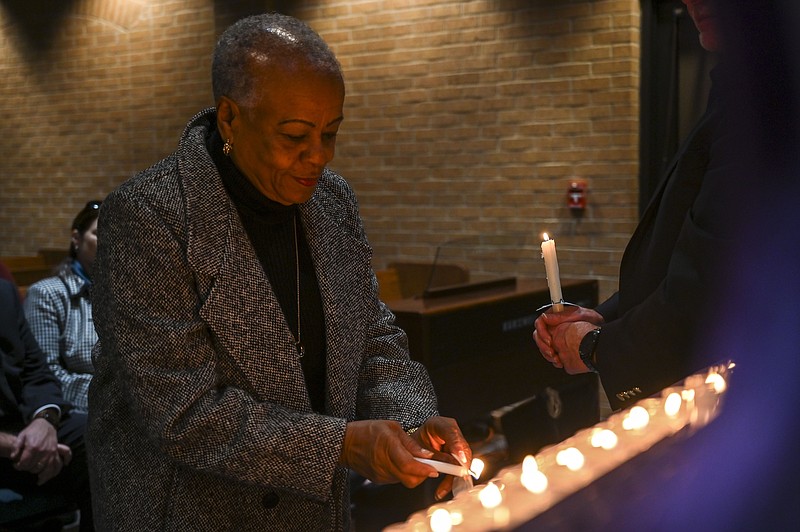TEXARKANA, Texas - People with loved ones affected by Alzheimer's disease and other forms of dementia gathered Thursday evening at Williams Memorial United Methodist Church to remember them and hear a comforting message.
The Texarkana-based Alzheimer's Alliance Tri-State Area held its annual commemorative candlelight service, described in a program as a chance to "reach out to one another with love, understanding and hope."
"Alzheimer's affects everybody," said John Ross, president of the Alzheimer's Alliance's board of directors, adding that acts of remembrance can bring back those lost to the disease.
"In that sense, we can make those victims eternal in our hearts and minds," Ross said.
Williams Memorial's senior pastor Brad Morgan spoke about his grandmother, who because of dementia could not remember his name at the end of her life. He compared the light in her blue eyes with the sunlight that during the day shines through the blue stained glass he was standing in front of. Though the sun had set, it will rise again, he said, referring to Christian beliefs about the afterlife.
"There is a day yet to come, a new horizon, a new dawn," he said.
The event was held in conjunction with National Alzheimer's Awareness Month, which President Ronald Reagan established in 1983. Raising awareness of Alzheimer's and the availability of local resources is the goal, not only in November, but all year long.
The Alzheimer's Alliance provides resources and educational materials for families dealing with Alzheimer's, support groups and the Our Place Day Respite Center, where caregivers can take their loved one with dementia and for a much-needed break.
People with Alzheimer's see a slow decline in brain function resulting in memory loss and difficulties with language. They can experience psychiatric disorders, including depression and delusions, and a decline in the ability to care for themselves. Because of the nature of the illness, Alzheimer's is particularly hard on the caregivers.
The cause of Alzheimer's isn't known, but researchers believe it's a combination of lifestyle, genetic and environmental factors.
Even though there isn't a cure for Alzheimer's, early diagnosis is still important, as there are some medications that could delay the onset of more severe symptoms.
Some facts about the disease, according to the Alzheimer's Association:
Alzheimer's disease is the sixth leading cause of death in the United States.
More than 16 million Americans provide unpaid care for people with Alzheimer's or other dementias.
These caregivers provided an estimated 18.5 billion hours of care valued at nearly $234 billion.
Between 2000 and 2017, deaths from heart disease have decreased 9% while deaths from Alzheimer's have increased 145%.
One in three seniors dies with Alzheimer's or another dementia. It kills more than breast cancer and prostate cancer combined.
Only 16% of seniors receive regular cognitive assessments during routine health checkups.
In 2019, Alzheimer's and other dementias will cost the nation $290 billion. By 2050, these costs could rise as high as $1.1 trillion.
About 5.8 million Americans are living with Alzheimer's. By 2050, this number is projected to rise to nearly 14 million.
Every 65 seconds someone in the United States develops the disease.


